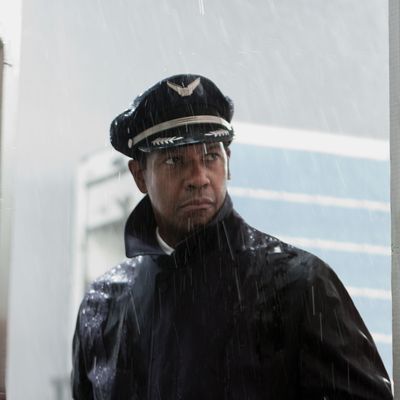
No actor is as brilliant, or as cunning, as Denzel Washington at portraying superhuman coolness and the scary prospect of its loss. Watch him in Flight as airline captain “Whip” Whitaker (excellent name!) as he Hoovers a line of cocaine to counteract a blood-alcohol level that would topple a lesser man and jauntily heads for a plane carrying “102 souls” with the Stones blasting. His responses, in spite of everything, are acute — Whip is whip-smart. Even when out of control, even after he stumbles on the first step to the plane, he flirts tantalizingly, seductively with self-mastery. Despite everything, you think he just might be able to fly as well or better than anyone else. Because it’s all about control. And because he’s Denzel.
In his last live-action feature, 2000’s Cast Away, Robert Zemeckis devised the most harrowing plane crash I’d seen on film, but whenever the movie’s action shifted to the civilized world, his direction seemed fuzzy and out of touch. Flight is his triumphant rebound — this time, Zemeckis is electrically in tune with his protagonist. Known for a strain of conservatism, he manages to portray a decadent, drug-addled society without loitering to moralize. And he tops that Cast Away plane sequence in a barnstorming action set-piece: Whip, drunk as a skunk, lands his bird as it’s literally coming apart. Waking up, he shows a genius for calculating ways to slow the plane’s plunge and recover control. While his straitlaced co-pilot essentially gives up, Whip jettisons the fuel, sits the head flight attendant (Tamara Tunie) down to push buttons and work levers, and finally flips the plane upside down to slow its rate of descent. And his voice — to his colleagues and air-traffic control — never cracks, never betrays a hint of panic. Bravo, Whip! Bravo, Zemeckis!
You’d expect the movie to decelerate — perhaps fatally — after its key sequence, but momentum is somehow maintained. Flight centers on addiction and, inevitably, recovery, and the arc of every recovery saga is pretty much the same: I’ve come to dread the inevitable twelve-step meeting. But the tight script by John Gatins (not based on a true story) daringly prolongs Whip’s denial (i.e., “not a river in Egypt”) as the National Transportation Safety Board swoops in to investigate the crash — and to figure out how to handle a toxicology report on the pilot that could be pinned up in every rehab-clinic lounge. (“Holy crap! Check out the blood-alcohol level!”)
You read Washington’s face as Whip broods in his hospital bed, a media hero who watches TV reports of the crash and its victims and knows he’s on the verge of a public shaming. In a stairwell where he goes for a smoke, Whip finds himself in the company of Nicole (Kelly Reilly), a heroin addict who’d OD’ed, and a terminal cancer patient (James Badge Dale), who wittily, sardonically, tragically raises the specter of God and of how much control we have over our own lives. It’s a good, dry performance, and the scene is so affectionate that it almost supplants the plane crash as the movie’s centerpiece. Now Whip pours out all his booze, now he buys some more, stopping, starting, stopping, always lying to his union handler (Bruce Greenwood) and the super-lawyer-fixer (Don Cheadle) hired to limit the airline’s liability.
Cheadle’s ultraserious performance is probably more amusing if you remember his star-making turn as the wildly funny sociopath opposite Washington’s cool private eye in Devil in a Blue Dress. But he and Greenwood make good foils for the wayward Whip and John Goodman as Whip’s gonzo drug dealer. (Goodman is so over-the-top hilarious that he redeems the heavy-handed use of “Sympathy for the Devil” that underscores both of his big scenes.) Helped by the script, the acting is unusually consistent for a Zemeckis picture. Melissa Leo as the largely unseen NTSB nemesis is splendidly sobering as she assumes command of the climactic hearing. In the stock role of the struggling-addict girlfriend, the Brit Reilly has a southern accent and finds the character in its cracks and changes in pitch, its broken musicality. Watch her raw, open face as she hesitantly suggests to Whip (guzzling from a bottle of gin) that he might, uh, be an alcoholic. She’s too anxious about triggering conflict to do more than observe his precipitous plunge.
He’s going down like that plane. The audience I saw the film with — it was a promo screening with little in the way of media — groaned whenever Washington picked up a bottle: Denzel has so much stature, his cool is so archetypal, that we don’t want to see him lying on the floor surrounded by empty bottles mumbling to himself as he slips into oblivion. (Being riddled with bullets in Training Day—that’s fine. He got an Oscar.)
There’s something eerily self-absorbed about Washington. He’s not an actor who opens himself up—you never quite feel you know him, underneath. But that’s why his onscreen explorations of control and its opposite feel so right, so true to who he is as a performer and a man. When you watch Joaquin Phoenix in The Master, you see the Method at its most perilous and wobbly: You see an actor who has lost control as an actor and with it the ability to shape his performance. Phoenix is vivid but he’s all over the place: If he played Whip, he’d be dissolving in the first shot, randomly zigging and zagging in the ether. But Washington takes Whip to another level. Despite the script’s overfamiliar beats (yes, there are twelve-step meetings), he anatomizes Whip’s existential seesaw. He breaks Whip’s—and his own—cool into pieces, the good and the bad, the supremely potent and pathetically impotent. This is a titanic performance.
This review was originally published in the November 5 issue of New York Magazine.


